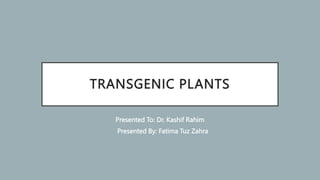
Transgenic Plants.pptx
- 1. TRANSGENIC PLANTS Presented To: Dr. Kashif Rahim Presented By: Fatima Tuz Zahra
- 2. TRANSGENIC PLANTS Transgene: • It is a foreign gene or genetic material that has been transferred by genetic engineering techniques from one organism to another. Transgenesis: • The process of introduction of exogenous DNA into the genome. Transgenic Plant: • The plant whose genome is altered by adding one or more transgenes
- 3. TRANSGENIC PLANTS History • 1982, 1st transgenic plant produced which is tobacco plant. • 1984, 1st successful plant genetic engineering experiments using caulimovirus vector • 1994, 1st genetically modified crop approved for sale in U.S. was FlavrSavr tomato. • 1995, 1st pesticide producing crop, Bt. potato was approved by U.S. Environment protection department.
- 4. TRANSGENIC PLANTS • 1996, 1st genetically modified flower Moondust, bluish colored carnation, was introduced. • 2000, Golden rice with ß-carotene developed with increased nutrient value.
- 5. Applications: • Resistance to Biotic stresses Insect resistance Bacterial resistance Virus resistance • Resistance to Abiotic stresses Temperature Drought Salinity TRANSGENIC PLANTS
- 6. • Valuable tool in studies • Improved coloration • Pharmaceuticals and vaccines products • Improvement of crop yield and quality • Phytoremediation Popular tree TRANSGENIC PLANTS
- 7. PRODUCTION OF TRANSGENIC PLANTS Methods Recombinant DNA Selection and isolation of desired gene Insertion of gene into vector Transformation Agrobacterium gene transfer Gene gun method (also called Particle gun method) Electroporation method
- 8. AGROBACTERIUM MEDIATED GENE TRANSFER • Agrobacterium is treated as nature’s most effective plant genetic engineer • The bacterium releases T-DNA segment of Ti plasmid into the plant cell cytoplasm which induce crown gall disease • Several dicots are affected by this disease e.g. Grapes, Roses etc.
- 10. ELECTROPORATION • The process in which an electricity is applied to cell membrane to form pores on its surface for transfer of foreign gene. • If DNA is present in the buffer solution at sufficient concentration, it will be taken up through these pores. • Protoplast is used in this process.
- 11. ELECTROPORATION • Protoplast and gene of interest are placed in a solution and electric pluses are given • Foreign DNA then integrated into plant genome
- 12. GENE GUN • Also known as Biolistic, particle gun, bio blaster or micro projectile bombardment. • Process occurs with a highly accelerated velocity into the plant cell nuclei • Introduction of DNA into the cell using micro projectile • DNA coated particles shot into target cell
- 14. EXAMPLES • Golden rice • Flavr savr Tomato • Colorful cauliflower • Tearless onion • Purple rose • BT cotton • Alfalfa
- 15. GOLDEN RICE • Transgenic technology produced a type of rice that accumulates ß- carotene in rice grains. • When it is consumed, b-carotene is converted into vitamin-A • It contain 37mg/g of carotenoid of which 84% is ß-carotene.
- 16. FLAVR SAVR TOMATO • This is produced by antisense technology. • The polygalactouronase gene, which is responsible for fruit decay is silenced.
- 17. BT COTTON • Bt cotton is a genetically modified crop that is resistant to pest bollworm.
- 18. BT CORN • Corn modified with a bacterial insecticide gene so that it produces insect toxins within its cells, protecting it from pest species.
- 19. TRANSGENIC PLANTS • Advantages 1. Increase yields 2. Rich in nutrients 3. Resistance to biotic and abiotic stresses • Disadvantages 1. May cause allergic reactions 2. Loss of biodiversity 3. GM crops could cross breed with wild crops and contaminate them with unexpected results.
- 20. Thank you!